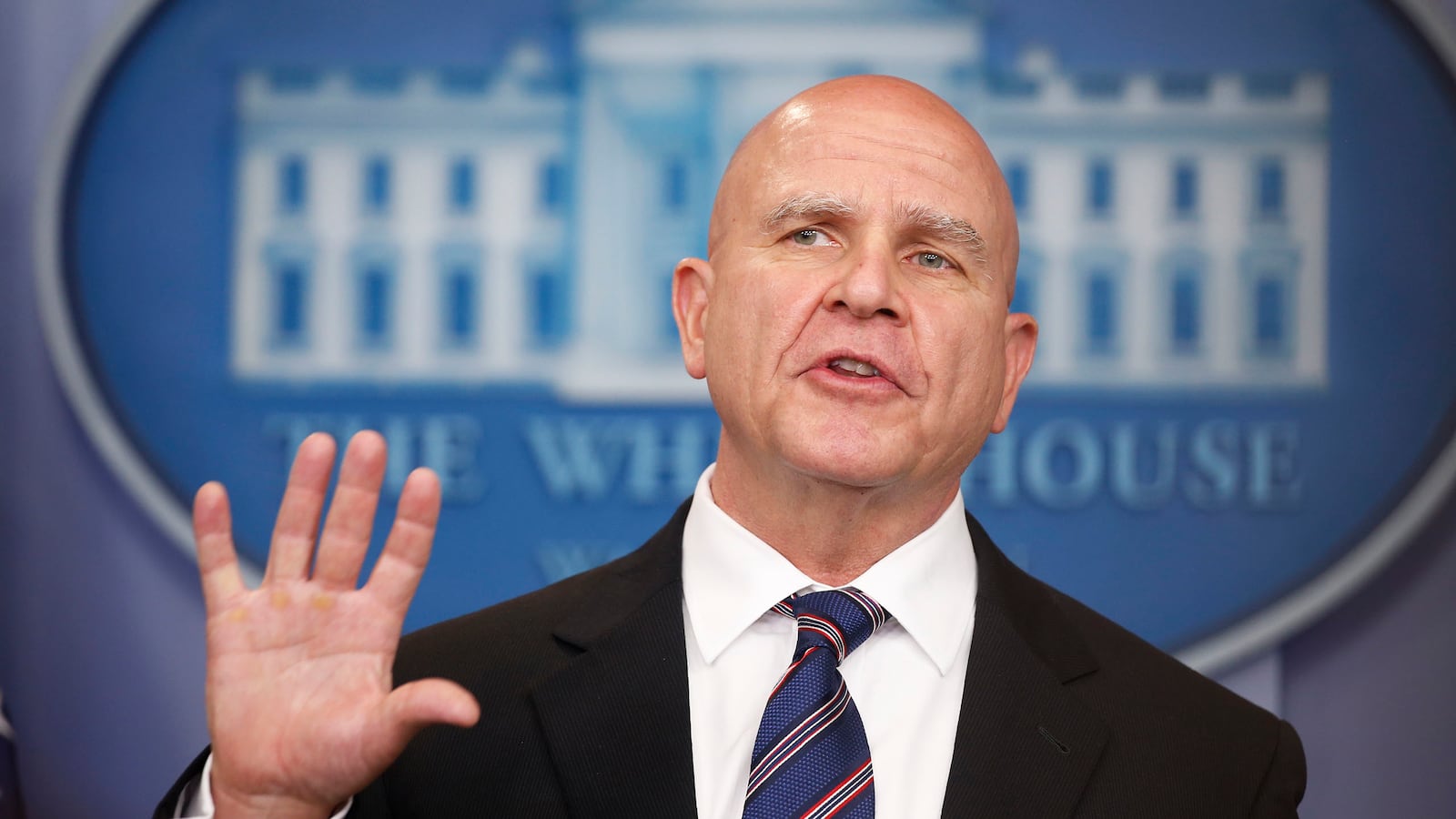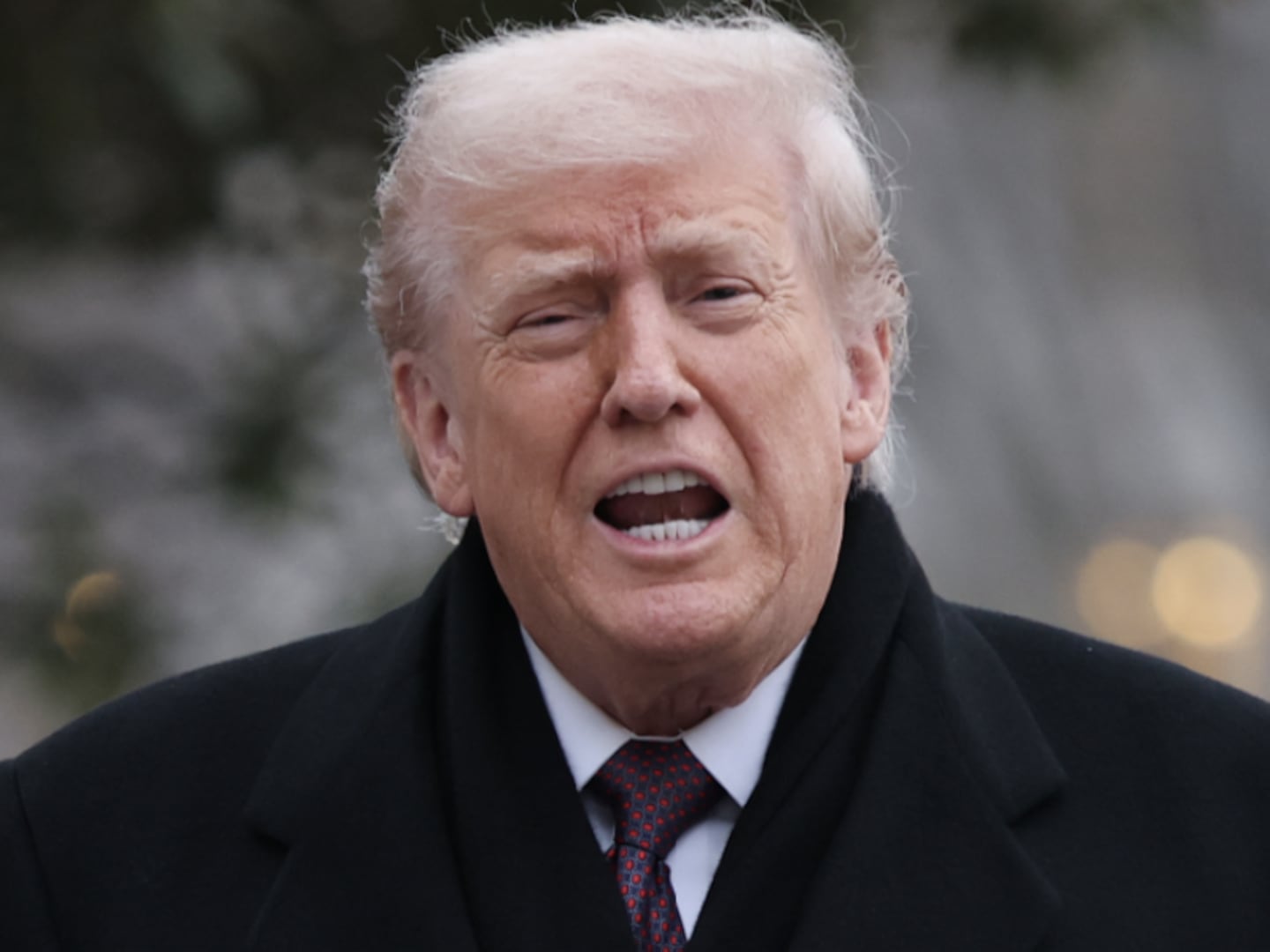Lt. Gen. H.R. McMaster has long been considered one of the best generals of his generation—a scholar-soldier with a reputation for speaking truth to power.
All of which made the National Security Adviser’s appearance Tuesday in the White House briefing room extra bizarre. Over the course of 17 muddled minutes, he all-but-admitted that President Donald Trump shared classified information with representatives of the Russian government. Then he claimed that the media was jeopardizing national security by reporting on the disclosure of such sensitive information. Then McMaster said some of the information actually wasn’t so sensitive—in fact, you could read about it in the press. It all climaxed with McMaster insisting that Trump didn’t know where this classified information came from (according to The New York Times, it was Israeli intelligence), but was totally justified in giving it to the Russians, anyway. In the process, the general—who literally wrote the book about standing up to presidential authority—was forced to play press flack for an administration reluctant to share key details. Sean Spicer, with less hair.
It was part of a dizzying performance by a White House where confused, head-spinning explanations have become a daily occurrence.
"Gen. McMaster is a respected individual. He's clearly trying to protect the president, and I respect that. But I don't see how you can defend the president of the United States sharing sensitive, classified information with Russia," said Sen. Ben Cardin, the top Democrat on the Senate Foreign Relations Committee. "I understand that his staff would like to think this is overblown, but then the president came back and said he did it! It looks like he is acknowledging it."
Between McMaster’s appearance and an off-camera briefing from Spicer later in the day, the White House’s public line was clear, even if its narrative of events surrounding the president’s meeting with Russian diplomats was not. The real problem, they say, isn’t that the president divulged information that the White House still has not denied was classified—it’s that someone in the meeting told The Washington Post about it.
“Our national security has been put at risk by those violating confidentiality and those releasing information to the press that could be connected to other information that’s publicly available to make Americans more vulnerable,” McMaster said. He called leaks to the media “the real issue.”
That talking point reflects the White House’s crisis communications strategy in the wake of the Post’s report, which claimed that Trump had shared sensitive intelligence details with the Russians that included the city in ISIS territory in which an allied intelligence service—Israel’s, the New York Times reported on Tuesday—obtained information about potential attacks on the U.S. homeland.
Israeli officials in Washington declined to comment on The New York Times report. "Israel has full confidence in our intelligence sharing relationship with the United States and looks forward to deepening that relationship in the years ahead under President Trump," Israel's Ambassador Ron Dermer said in a statement emailed to The Daily Beast.
But the White House had plenty to say. Asked by The Daily Beast on Monday night if this controversy would accelerate President Trump’s demands for a major crackdown on national-security leaks, a senior White House official replied, “definitely.”
"You should expect to hear a lot about [IC leaks and] fake news,” the official added.
By Tuesday morning, the president was angrily tweeted about “find[ing] the LEAKERS in the intelligence community,” and his National Security Adviser was busy touting the new company line.
But even as the White House tried to spin reporters on the leak, it was all but silent on Capitol Hill, where even leading Republicans said they were almost entirely in the dark about what was said at last week’s meeting—and what was not.
"My major concern right now is that I don’t know what the president said,” Senate Intelligence Committee chairman Richard Burr, a Republican, told reporters on Tuesday. “I want to talk to people who were in the room. I'd like to think somebody from the White House who was in the room is going to get on the phone and tell me what they said. I've been trying to get [a phone call] all morning. Maybe they're busy."
The West Wing has been engulfed this month in a seemingly perpetual state of chaos and confusion, including the shambolic handling of FBI Director James Comey’s ouster. In recent days, according to multiple White House sources, Trump has grown absolutely “furious” with his senior staff and advisers, who keep trying, and often failing, to keep up with a boss who repeatedly undercuts and blames, and throws them under the bus.
It’s a situation that White House staff and senior aides will often concede is a disaster of the president’s own fumbling creation.
“At this point I’m wondering if we’ll ever be able to stop talking about Russia,” a White House staffer vented to The Daily Beast on Monday. “It’s totally self-inflicted.”
McMaster has been widely touted as one of the “adults in the room” who could help curb some of the worst impulses of a uniquely dysfunctional and new administration. His combat tours in Iraq are near-legendary; his book, Dereliction of Duty: Lyndon Johnson, Robert McNamara, The Joint Chiefs of Staff, and the Lies that Led to Vietnam, is considered a modern classic in the genre. McMaster was supposed to be a major departure from the disastrous and brief tenure of Trump’s former national security adviser Michael Flynn, and was supposed to serve as a colder-headed check on the 45th president’s impulses. But by Tuesday morning, the general was playing clean-up—a full-time job for Trump’s White House team that has left aides exhausted and literally face-palming.
All the while, McMaster appeared to confirm some key aspects of information from the Post report. He defended the president’s reported decision to share the name of the city in ISIS territory where the intelligence was gathered, but said that that detail could have been gleaned in any case from existing “open source reporting.” The president couldn’t have revealed the “sources and methods” behind the intelligence in question, McMaster said, because he had not been briefed on that information prior to the meeting.
That admission reflects Trump’s explicit preference for brevity in his intelligence briefings, which a former senior intelligence official described as a break from the practices of past administrations, including President Obama’s.
The CIA has tailored its daily presidential briefing, at the president’s request, to a one-page bullet-point summary, and a few extra pages of text, said the former official, who spoke on condition of anonymity to discuss details of those briefings.
Trump sometimes asks the source of a particular intelligence report, and if he asks, the briefers answer, CIA chief Mike Pompeo said in remarks at the Center for Strategic and International Studies last month. But it is not unusual or unheard of that he might not know the source of everything he's being briefed on—because of the brevity of the report and also because unlike Obama, he doesn't enjoy getting into the minutiae as much.
Though Trump had not been thoroughly briefed on the intelligence at issue, what he did share with the Russians was “consistent with the routine sharing of information between the president any leaders with whom he’s engaged,” McMaster said on Tuesday.
Asked whether that information had been cleared for disclosure to the Russians by relevant federal authorities, McMaster suggested that the president’s comments were extemporaneous. “He made the decision [to share that information] in the context of the conversation.”
McMaster’s focus on leaks to the press as the more troubling national security threat reflects an emerging White House strategy to crack down on leaks from what the president considers a hostile cadre of Obama administration holdovers and career intelligence officials who oppose his presidency.
McMaster’s performance at Tuesday’s briefing reflected that tension between the administration and the press, a White House staffer said. “I thought he did well with what he had. You’re constrained in terms of what you can talk about, and when you’re on the record you can’t share things that a leaker violating those rules can share. So we’re already at a disadvantage in terms of the press.”
Another White House aide, sounding resigned, simply stated that “he did the best he could with what he was handed.”
On Capitol Hill Republicans are showing exasperation with the constant drama that seems to dominate this White House.
"There's some alignments that need to take place over there, and I think they're fully aware of that. Just the decision-making processes, and everybody being on the same page,” Senate Foreign Relations Committee Chairman Bob Corker told The Daily Beast, something that he has conveyed this "very directly to principals there."
"Whenever there's drama going on over there, it's tougher for the agenda here. But I suppose it's going to continue, so I'll have to get used to it,” added GOP Sen. Jeff Flake.
The House Intelligence Committee is set to be briefed by CIA Director Mike Pompeo Tuesday evening, a committee aide told The Daily Beast. The meeting was previously scheduled. But it is sure to bring questions about the latest fiasco to hit the White House.
— with additional reporting by Kim Dozier and Noah Shachtman.








